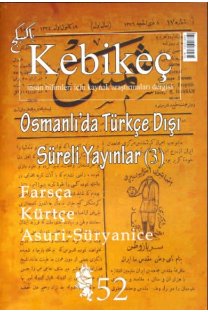Avrupa "Miras" sinemasına eleştirel bir bakış: Graefın Sophia Hatun
Özet: Bu makale Türkiye kökenli Alman yönetmen Ayşe Polat'ın kısa filmi Gräfin Sophia Hatun u (1997) "miras sineması" ve "kostüme film" uylaşımları ve bu türlerle ilgili (özellikle İngiltere ve Almanya'da gelişen) söylemler çerçevesinde inceler. "Miras sineması" kavramı, bu deneysel filmi, Avrupa'da baskın ve popüler olan film üretimiyle bağlantılı olarak inceleme olanağı verir: Gräfin Sophia Hatun çok yönlü sürgün ve yersiz-yurtsuzluk durumlarım, Türkiye'den Almanya'ya 1960'larda başlayan işçi göçü bağlamında ele alırken, miras sinemasının temel uylaşımlarından yararlanır. Ancak, farklı dünyaları, dilleri ve kültürleri eleştirel bir bakış açısıyla örtüştürerek, anaakım sinemanın geleneksel hikâye anlatımını, biçemini, karakter ve izleyici konumlarını sorgular ve sorunsallaştırır. Türkiyeli bir mülteciyi aristokratik Alman tarihinin bir parçası kılarak, diasporik bellek ve kimliğin, "ev sahibi" ulusun söylemleri ve pratikleri ile diyalektik bir ilişki içinde kurulduğuna işaret eder. Geçmişin Türkiye-Alman işçi göçü filtresinden geçirilen bu yeniden anlamlandırılması, Almanya'daki ve Avrupa genelindeki asimilasyon, uyum ve vatandaşlık tartışmalarına yeni bir boyut kazandırır.
Abstract: This article investigates the Turkish-German director Ayşe Polat's short-movie Gräfin Sophia Hatun (1997) in relation to the discourses and practices of "heritage cinema" and "costume drama" (in particular British and German heritage cinema). The concept of "heritage cinema" provides a framework to examine an experimental film vis-à-vis the hegemonic and mainstream European film production and consumption: Gräfin Sophia Hatun mobilizes the conventions of heritage film to articulate multifaceted exilic conditions in the context of a complex reconsideration of contemporary labor migration from Turkey to Germany, which started in the 1960s. Through a critical juxtaposition of different worlds, languages and cultures, the film questions and problematizes mainstream cinema's conventions of storytelling, form, character and spectator positioning. Through embedding a refugee from Turkey into the aristocratic German past, it suggests that diasporic memory and identity is necessarily constructed in a dialectical relationship with the discourses and practices of the "host" nation. This re-signification of the German past, filtered through the prism of Turkish German labor migration, casts fresh light on the issues of assimilation, integration, and citizenship in contemporary Germany and Europe.
___
Deleuze, Gilles (1989), Cinema 2: The time-image, çeviri Hugh Tomlison ve Robert Galeta, Minneapolis, University of Minnesota Press.Deleuze, Gilles and Felix Guattari (1988), A Thousand Plateaus: Capitalism and Schizophrenia, çeviri. Brian Massumi, Londra, Athlone Press.
Gait, Rosalind (2Ö06), The New European Cinema: Redrawing the Map, New York, Columbia University Press.
Higson, Andrew (2003), English Heritage, English Cinema: Costume Drama Since 1980, Oxford, New York, Oxford University Press.
Huyssen, Andreas (2003), "Diaspora and Nation: Migration Into Other Pasts," New German Critique, New York, sayı: 88.
Koepnick, Lutz (2002), "Reframing the Past: Heritage Cinema and Holocaust in the 1990s," New German Critique, sayı: 87.
Koepnick, Lutz (2004), "'Amerika gibt's überhaupt nicht': Notes On The German Heritage Film", German Pop Culture: How American' Is It?, Agnes Mueller (ed.), Ann Arbor, University of Michigan Press.
Marks, Laura U. (2000), The Skin of the Film: Intercultural Cinema, Embodiment and Senses, Durham, Duke University Press.
Rentschler, Eric (2002), "Postwall Prospects: An Introduction," New German Critique, sayı: 87.
Rueschmann, Eva (2003), "Mediating Worlds/Migrating Identities," Moving Pictures, Migrating Identities, University Press of Mississippi Press.
Schneider, Rebecca (1997), The Explicit Body in Performance, Londra, New York, Routledge.
Soysal, Levent, (2003), "Labor to Culture: Writing Turkish Migration to Europe," South Atlantic Quarterly, sayı: 102.
- ISSN: 1300-2864
- Yayın Aralığı: 2
- Başlangıç: 1995
- Yayıncı: Mehtap Yüksel
Sayıdaki Diğer Makaleler
Milattan bir milyon yıl önce: " Tarih Öncesi" filmler
Düş şatolarından çoklu salonlara değişen seyir kültürü ve sinema
Sinemada biyografik öyküler: İris,Frida,Sylvia,
Sessiz sinema ve film arşivleri
Avrupa "Miras" sinemasına eleştirel bir bakış: Graefın Sophia Hatun
